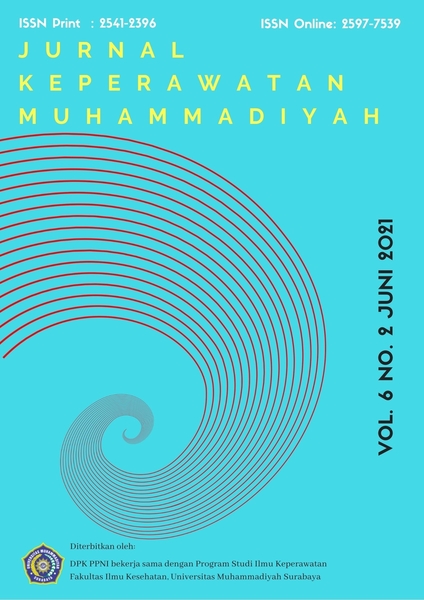Pengaruh Bimbingan Berpusat Pada Klien Terhadap Kemandirian Pasien Diabetes Mellitus Tipe 2
DOI:
https://doi.org/10.30651/jkm.v6i2.7916Keywords:
Diabetes Mellitus, client-centered guidance, IndependenceAbstract
Background: Diabetes Mellitus is a disease characterized by an increase in blood glucose levels which has a risk of long-term or short-term complications. The inability of the community to carry out treatment independently is one of the causes that affect the ability of Diabetes Mellitus sufferers to carry out activities.
Objective: This study aims to analyze the effect of client-centered guidance on independence in Diabetes Mellitus patients.
Methods:This study used a quasy-experimental design with a pre-post test control group design approach, The sample in this study was 46 respondents divided into 23 interventions group and 23 control groups. The sampling technique is consecutive sampling. The intervention was given by providing client-centered guidance on day 1 with 4 stages, time duration ± 60 minutes, and evaluation for 7 days. Analysis of data using an independent t-test with a significance level of = 0.05.
Results: The results of the t-test independent t-test with the value of P = 0.001, it means is an effect of client-centered guidance on the independence of Diabetes Mellitus patients.
Conclusion: Providing client-centered guidance can increase independence and it can as part of nursing care interventions in the form of a support education system.References
Baraz, S., Zarea, K., & Bibi, H. (2018). Diabetes & Metabolic Syndrome : Clinical Research & Reviews Impact of the self-care education program on quality of life in patients with type II diabetes. Diabetes & Metabolic Syndrome: Clinical Research & Reviews, 11(2017), S1065–S1068. https://doi.org/10.1016/j.dsx.2017.07.043
Soediono, B. (2015). IDF Diabetes Atlas 2015 summary. Idf. https://doi.org/10.1289/image.ehp.v119.i03
Kusnanto. (2012). Self care management - holistic psychospiritual care. Jurnal Ners, Volume 7, 99–106.
Namora, L. L. (2011). Memahami Dasar - Dasar Konseling Dalam Teori Dan Praktik ,. Jakarta: Kencana Prenada Media Grup.
Powers, M. A., Bardsley, J., Cypress, M., Duker, P., Funnell, M. M., Fischl, A. H., … Vivian, E. (2017). Diabetes Self-management Education and Support in Type 2 Diabetes. The Diabetes Educator. https://doi.org/10.1177/0145721716689694
Counseling, 87(2), 178–185. https://doi.org/10.1016/j.pec.2011.08.013
Sam, N. (2017). Analisis Hubungan Activity Of Daily Living (Adl), Aktivitas Fisik Dan Kepatuhan Diet Terhadap Kadar Gula Darah Pasien Diabetes Melitus Di Wilayah Kerja Puskesmas Poasia Tahun 2017. Jurnal Ilmiah Mahasiswa Kesehatan Masyarakat, Vol. 2
Azhara N, K. L. (2014). Faktor risiko diabetes melitus tipe 2 di wilayah kerja puskesmas kedungmundu kota semarang. Jurnal Kesehatan Universitas Dian Nuswantoro.
Purnama Sari, N. putu. (2017). Nursing Agency Untuk Meningkatkan Kepatuhan, Self-Care Agency (Sca) Dan Aktivitas Perawatan Diri Pada Penderita Diabetes Mellitus (Dm). Jurnal Ners Lentera, Vol. 5.
Konradsdottir, Elisabet & Erla, K. S. (2011). How effective is a short-term education and support intervention for families of an adolescent with type 1 diabetes. Journal for Specialist in Pediatric Nursing 16.
Indian Health Diabetes Best Practices. (2011). Indian Health Service Division of Diabetes Treatment and Prevention.
Downloads
Published
Issue
Section
License
- Penulis tetap memegang hak atas karyanya dan memberikan hak publikasi pertama kepada jurnal ini yang secara simultan karya tersebut dilisensikan di bawah:Â Creative Commons Attribution-ShareAlike 4.0 International (CC BY-SA 4.0)













